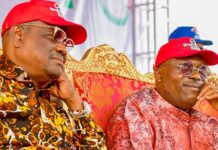Indications have emerged that the Independent National Electoral Commission (INEC) may have to postpone the scheduled conduct of the 2023 general elections if President Muhammadu Buhari acts on the electoral bill sent to him after February 22, 2022.
Immediately after the 2019 general elections, INEC, which is the electoral umpire empowered by law to fix dates of elections, scheduled the 2023 presidential and National Assembly elections for February 18, 2023.
But barely a year to the presidential election, INEC is yet to issue guidelines for the conduct of the election on the ground that it is waiting for a new electoral act.
According to Section 28 (1) of the Electoral Bill 2022, INEC is required to issue a notice of election not later than 360 days before the day appointed for an election.
INEC had already scheduled the 2023 presidential and National Assembly election for February 18, 2023.
The Electoral Bill 2022 stipulates that the deadline for INEC to issue the notice of election for the 2023 general election is February 22, 2022.
The executive director, Yiaga Africa, Samson Itodo, said, “In line with the Electoral Bill 2022, the deadline for INEC to issue the notice of election for the 2023 general election will be 22nd February 2022 and not February 18, 2022 – the reasons being that the total number of days from February 22nd, 2022, to February 17th, 2023, is 360 days.”
The Electoral Bill 2022 was transmitted to President Muhammadu President for assent on January 31, 2022., and by virtue of Section 58(4) of the 1999 Constitution, he has a timeline of 30 days to give or decline assent to the Bill.
On the contentious 2022 electoral act amendment bill sent to Buhari, he has up to March 2, 2022 to indicate where he stands on the bill.
“If the president gives assent to the bill on or before February 22nd, 2022, INEC will be legally bound to issue Notice of Election, and the dates for the 2023 elections will be maintained,” Itodo said.
“However, if the president acts on the bill after 22nd February, 2022, the dates for the 2023 election and other subsequent electoral activities will be affected, which will force INEC to reschedule the 2023 general election dates.
“Granting presidential assent to the Electoral Bill, 2022, on or before 22nd February 2022, is in the best interest of our electoral democracy,” Itodo added.
Civil society organisations (CSOs) have reiterated their call on President Buhari to sign the electoral bill transmitted to him by the National Assembly bureaucracy on time if the dates of elections are to remain unchanged, warning that time was running out.
According to the CSOs, if the president signs the bill on time, it will help the INEC to issue guidelines for the 2023 general elections and make all the necessary preparations as required by the new law.
The CSOs urging Buhari to sign the bill are: Yiaga Africa, International Press Centre (IPC), Centre for Citizens with Disability (CCD), The Albino Foundation, CLEEN Foundation, Institute for Media and Society (IMS) and Nigerian Women Trust Fund (NWTF).
Others are: Premium Times Centre for Investigative Journalism (PTCIJ), Partners for Electoral Reform (PER), Civil Society Legislative Advocacy Centre (CISLAC), Women Advocates Research and Documentation Centre (WARDC), Nigeria Network of Non-Governmental Organisations (NNNGO) and Inclusive Friends Association (IFA).
The executive director, Yiaga Africa Samson Itodo said the CSOs are happy the errors they found in the bill earlier rejected by Buhari had been corrected.
Itodo also pointed out that the issues raised by the president had also been addressed, and now it is for him to sign the bill on time to enable smooth preparations for the 2023 general elections.
“The National Assembly should be commended for accelerating the entire process of the review. We are glad that they reworked the bill and the drafting errors might have been resolved. We hope that there are no errors and there are no cross-referencing gaps.
“Now that it has been transmitted, we hope that the president will assent to the bill on time because we are running out of time. All the issues that he raised have been addressed and we expect him to sign the bill within one week.
“The law said that within 360 days to election, INEC is required to issue the notice of election. We don’t want the president to waste any further time because this is a critical moment for democracy,” Itodo added.





